Environs of Zaragoza, the capital of the Kingdom of Aragon, and in the mountains of Vizcaya (Biscay), around 1412
Outside the guardroom of Aliaferia Palace in Aragon, Count di Luna's soldiers are waiting to apprehend Manrico, a troubadour, who rivals the count for the favors of the Lady Leonora. Ferrando, captain of the guard, keeps his men awake by telling them of a Gypsy woman burned at the stake years ago for bewitching Di Luna's younger brother. The Gypsy's daughter sought vengeance by kidnaping the child and, so the story goes, burning him at the very stake where her mother died. Di Luna, though, still hopes his brother lives.
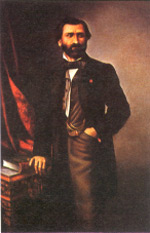 In the palace gardens, Leonora confides to Inez how at a tournament she placed the victory wreath on the brow of an unknown knight in black armor; she saw him no more until he came to serenade her. Though Inez has misgivings, Leonora declares her love for the handsome stranger. No sooner do the women reenter the palace than Di Luna arrives to court Leonora. Simultaneously Manrico's song is heard in the distance, and Leonora rushes to greet him. The jealous count challenges Manrico to a duel, and they hurry away.
In the palace gardens, Leonora confides to Inez how at a tournament she placed the victory wreath on the brow of an unknown knight in black armor; she saw him no more until he came to serenade her. Though Inez has misgivings, Leonora declares her love for the handsome stranger. No sooner do the women reenter the palace than Di Luna arrives to court Leonora. Simultaneously Manrico's song is heard in the distance, and Leonora rushes to greet him. The jealous count challenges Manrico to a duel, and they hurry away.
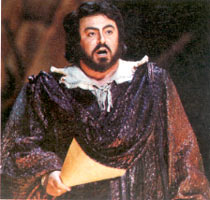 As dawn breaks in the Biscay mountains, Gypsies sing at work with hammer and anvil. Azucena - the Gypsy's daughter described by Ferrando - relives her mother's fiery execution, recalling the dying woman's plea for vengeance. Manrico asks to hear her full story, becoming confused when Azucena, overwhelmed with memories, blurts out that by mistake she hurled her own son into the flames. Assuring him of a mother's love, Azucena makes Manrico swear revenge, but he says a strange power stayed his hand when he could have killed Di Luna in the duel. A messenger brings news that Leonora, thinking Manrico dead, plans to enter a convent. Despite Azucena's pleas, Manrico rushes away.
As dawn breaks in the Biscay mountains, Gypsies sing at work with hammer and anvil. Azucena - the Gypsy's daughter described by Ferrando - relives her mother's fiery execution, recalling the dying woman's plea for vengeance. Manrico asks to hear her full story, becoming confused when Azucena, overwhelmed with memories, blurts out that by mistake she hurled her own son into the flames. Assuring him of a mother's love, Azucena makes Manrico swear revenge, but he says a strange power stayed his hand when he could have killed Di Luna in the duel. A messenger brings news that Leonora, thinking Manrico dead, plans to enter a convent. Despite Azucena's pleas, Manrico rushes away.
Di Luna, burning with passion for Leonora, waits by the cloister to kidnap her. When she enters with the nuns, he strides forward, only to be halted by Manrico, who suddenly appears with his men. As the forces struggle, the lovers escape.
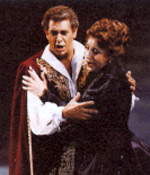 Di Luna has pitched camp near the bastion of Castellor, where Manrico has taken Leonora. After soldiers sing of their eagerness for victory, Ferrando leads in Azucena, who was found nearby. The Gypsy describes her poor, lonely life and says she is only searching for her son. Di Luna reveals his identity, at which Azucena recoils and is recognized by Ferrando as the supposed murderer of Di Luna's baby brother. The count orders her burned at the stake.
Di Luna has pitched camp near the bastion of Castellor, where Manrico has taken Leonora. After soldiers sing of their eagerness for victory, Ferrando leads in Azucena, who was found nearby. The Gypsy describes her poor, lonely life and says she is only searching for her son. Di Luna reveals his identity, at which Azucena recoils and is recognized by Ferrando as the supposed murderer of Di Luna's baby brother. The count orders her burned at the stake.
Inside the castle, Manrico assures Leonora her love makes him invincible. As the couple prepares to go to the wedding chapel, Manrico's aide Ruiz bursts in to say that Azucena has been seized and tied to a stake. Manrico stares in horror at the distant pyre, which has been lit. He runs to his mother's rescue, vowing vengeance.
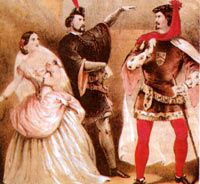 Ruiz brings Leonora to the foot of the captured Manrico's prison tower, where she voices her undying love and prays for his release. Monks are heard intoning a doleful Miserere for the soul of the condemned, while Manrico sings farewell from inside the bastion. Leonora resolves to save him. When Di Luna appears, Leonora agrees to yield to him but secretly swallows poison.
Ruiz brings Leonora to the foot of the captured Manrico's prison tower, where she voices her undying love and prays for his release. Monks are heard intoning a doleful Miserere for the soul of the condemned, while Manrico sings farewell from inside the bastion. Leonora resolves to save him. When Di Luna appears, Leonora agrees to yield to him but secretly swallows poison.
In their cell, Manrico comforts Azucena, who longs for their home in the mountains. No sooner does the old Gypsy fall asleep than Leonora rushes in to tell her lover he is saved, urging him to flee. Manrico comprehends the price of his freedom and denounces her, but the poison begins to take effect. He takes her in his arms as she dies. Furious at being cheated of his prize, Di Luna sends Manrico to the executioner's block, while Azucena staggers to her feet to see the ax fall. "He was your brother!" she cries; "Mother, you are avenged!"
|

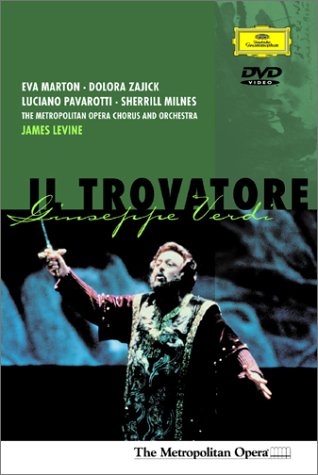

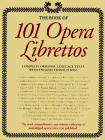



 View opera IL TROVATORE
View opera IL TROVATORE



